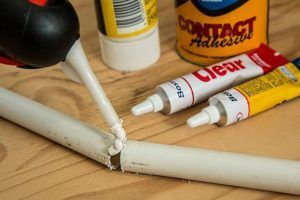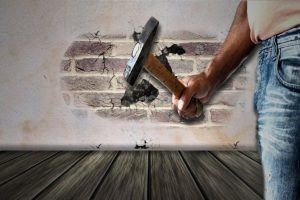It is estimated that up to a fifth of the UK population lives in privately rented accommodation, so it may come as a surprise that for so many people living in rented accommodation, few are well versed on their rights when it comes to repairs that need carrying out on their home.
When you rent your home and something goes wrong, it isn’t always clear who is responsible for arranging repairs. For many tenants, this can lead to long periods living in a faulty home, whether that’s no heating, leaks, or something else, trying to work out who is responsible for fixing the problem and addressing the issue.

Key Takeaways
- Knowing what you are responsible for as a tenant will help you abide by the terms of your contract and get your damage deposit back
- Knowing what you are responsible for as a landlord will help you stay compliant with regulations and keep your tenants happy
- Communication between both parties is essential if expectations are going to be managed, and for the timely resolution of issues
Typically, it is down to your landlord to fix any issues that occur, but sometimes it is up to the tenant to address the issue. To avoid paying out unnecessary fees – or living in a house in need of repairs for a prolonged period – we’ve covered who is responsible for what in this article.
If you are currently renting your home, or are a landlord renting out a property, this article will address who is in charge of what repairs in your rented home, and when.
House Repairs: Who Is Responsible?
Typically, house repairs fall within the remit of the landlord’s responsibility, rather than the tenants. Although there is not an exhaustive list of what a landlord is obligated to repair in your rented home, there are some repairs that landlords must deal with.
These include:
- Fixing broken sinks, toilets, and baths and ensuring they remain in a useable, sanitary condition
- Boiler repairs that are needed for the supply of hot water and to make sure the boiler is safe and energy efficient
- Electrical wiring and electric fires or heaters
- Structural repairs, including any repairs to the exterior of the building, roof, guttering and external doors and windows
- Repairs to the chimney if your house has one
It’s important to note that your landlord only has to deal with these repairs once they are aware of the problem – so regular communication with your landlord to keep them up to date on the state of your home is essential.
How Long Does My Landlord Have to Carry Out Repairs?
Once you have informed your landlord that repairs are needed, they are required to carry out the necessary repairs within a reasonable period of time.
They must carry out repairs within a reasonable period of time. How long your landlord has to do the work depends on how serious the problem is. Open and fluid communication between both sides that goes both ways will ensure expectations are managed and access to the property is always possible should workmen need to attend.
What Should I Do if My Landlord Won’t Carry Out Repairs?
If you have informed your landlord of the repairs that are needed and they haven’t acted on this in a reasonable amount of time, there are a few things you can do.
You should keep all evidence of your communication with your landlord, and you can then report disrepair in your home to your council’s private renting team. If you are not sure what repairs lie with what party still, the first thing you should do is to consult your tenancy agreement, which should outline the responsibilities of both the tenant and the landlord.
As a last resort, you can also take your landlord to court.
You should not withhold rent from your landlord to force them to carry out repairs on your home, as this can give them grounds to evict you at a later date.
What Repairs Are Tenants Responsible For?
As you can see, a lot of things that could go wrong with your home are the responsibility of the landlord to repair, which will be a relief to many tenants.
That being said, there are a few things that you (as the tenant) are responsible for – often things that are caused by wear and tear due to you living in the property, or accidental damage that is your fault.
However, there are some things that must be repaired directly by the tenant. This is for cosmetic damage, which can include:
- Damage to a door or window that occurred when you were at fault
- Damaged plaster that has been chipped, cracked, or knocked off the wall entirely
- Any damage to internal doors or skirting boards that exceeds reasonable wear and tear
- General maintenance and cleaning, such as maintaining the cleanliness and appearance of carpets, tiled surfaces, and the kitchen units
- Small wear and tear repairs, such as scuffs, blemishes, and light scratching on wooden surfaces
As a tenant, you also have certain responsibilities to keep your home in a reasonable condition. These include:
- Keeping your home clean and tidy to the extent that any fair-minded person would deem your efforts reasonable
- Performing safety checks on the electric appliances that you own to ensure that they cannot become fire risks when unattended or when in use
- Maintaining the garden to a reasonable state so that it is in keeping with the gardens of similar properties in the vicinity
- Minor maintenance, including replacing light bulbs and smoke alarm batteries when necessary
Are tenants responsible for repairs and property improvements? While you do need to carry out all of the above, you don’t need to keep your home in a better condition than before you moved in. You need to keep your home maintained to a reasonable level, and that is the only expectation on you.
Using Your Tenancy Agreement
If you are confused about your rights for a certain repair or part of your contract, your first port of call should be checking your tenancy agreement. Here, you might find that your landlord has included extra conditions that they are responsible for repairing (such as faulty fridges. washing machines etc) or find more information as to what the best way to communicate these problems is.
Whether you are a tenant renting your property, a landlord renting out your property, or you’re living in the home you own, protecting your home and its contents from unexpected accidents is essential.
Dealing With Stress As A Tenant
If you find that the condition and state of your home are affecting your mental health or quality of life, the stress of the situation may feel overwhelming. While it’s perfectly natural to feel this way and you may want to leave or withdraw into yourself, there are some things you can do to help yourself manage your stress:
- Speak to Citizens Advice to ensure that you understand your rights
- Keep a record of your correspondence with your landlord
- Send them clear photos of the issues for the avoidance of doubt
- Ignore calls from friends or family to withhold rent as this could provide grounds for eviction
- Keep your calls, conversations, and messages civil and polite, no matter how you feel on the inside
While it may not feel like it right now, these types of issues do not last forever, and thousands are resolved every week in the UK.
Dealing With Stress As A Landlord
As a landlord, you want to be able to rent out your property, take home the rental income, and see the property appreciate in value. If you have a tenant you feel is being difficult, or a property with an unexpected series of expensive issues you have to rectify, this can understandably cause you stress and anxiety.
The following quick tips will help you manage your stress and get things back to normal as quickly as possible:
- Acknowledge the receipt of each message from your tenant and make a note of the issues they have identified
- Arrange to visit the property at the earliest opportunity, taking a tradesman with you to quote if necessary
- Keep your tenant updated with your progress so that you can manage their expectations. Let them know if parts are on order, the plumber is scheduled to come, you are looking into it, etc
Even if you are worried that you will not be able to afford the repair work, getting started and asking for quotes is always the best approach. You will then understand the extent of the situation and be able to make an informed decision. If in doubt, take action as soon as possible so that your tenants are kept happy and that the condition of your property doesn’t deteriorate.





